Sonnet 3
莎士比亚154首十四行诗
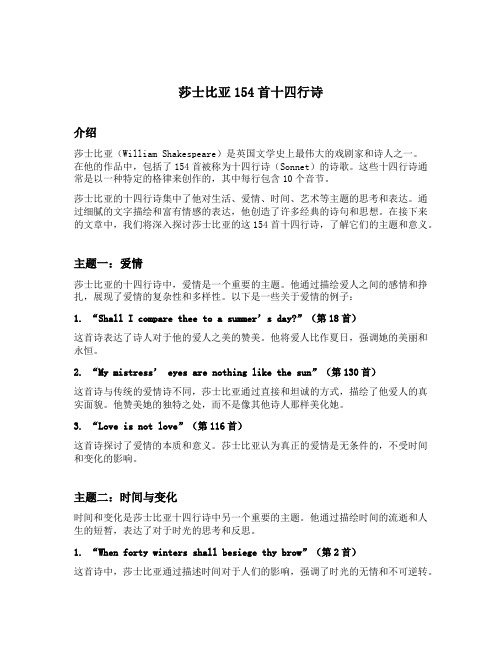
莎士比亚154首十四行诗介绍莎士比亚(William Shakespeare)是英国文学史上最伟大的戏剧家和诗人之一。
在他的作品中,包括了154首被称为十四行诗(Sonnet)的诗歌。
这些十四行诗通常是以一种特定的格律来创作的,其中每行包含10个音节。
莎士比亚的十四行诗集中了他对生活、爱情、时间、艺术等主题的思考和表达。
通过细腻的文字描绘和富有情感的表达,他创造了许多经典的诗句和思想。
在接下来的文章中,我们将深入探讨莎士比亚的这154首十四行诗,了解它们的主题和意义。
主题一:爱情莎士比亚的十四行诗中,爱情是一个重要的主题。
他通过描绘爱人之间的感情和挣扎,展现了爱情的复杂性和多样性。
以下是一些关于爱情的例子:1. “Shall I compare thee to a summer’s day?”(第18首)这首诗表达了诗人对于他的爱人之美的赞美。
他将爱人比作夏日,强调她的美丽和永恒。
2. “My mistress’ eyes are nothing like the sun”(第130首)这首诗与传统的爱情诗不同,莎士比亚通过直接和坦诚的方式,描绘了他爱人的真实面貌。
他赞美她的独特之处,而不是像其他诗人那样美化她。
3. “Love is not love”(第116首)这首诗探讨了爱情的本质和意义。
莎士比亚认为真正的爱情是无条件的,不受时间和变化的影响。
主题二:时间与变化时间和变化是莎士比亚十四行诗中另一个重要的主题。
他通过描绘时间的流逝和人生的短暂,表达了对于时光的思考和反思。
1. “When forty winters shall besiege thy brow”(第2首)这首诗中,莎士比亚通过描述时间对于人们的影响,强调了时光的无情和不可逆转。
2. “So sweet and lovely doth thy time make haste” (第60首)这首诗表达了莎士比亚对于时间的流逝的感叹。
sonnet十四行诗

• • • • • • • • • • • • • •
From fairest creatures we desire increase, That thereby beauty's rose might never die, But as the riper should by time decease, His tender heir might bear his memory: But thou, contracted to thine own bright eyes, Feed'st thy light'st flame with self-substantial fuel, Making a famine where abundance lies, Thyself thy foe, to thy sweet self too cruel. Thou that art now the world's fresh ornament And only herald to the gaudy spring, Within thine own bud buriest thy content And, tender churl, makest waste in niggarding. Pity the world, or else this glutton be, To eat the world's due, by the grave and thee.
• Imagery: Light and Darkness • But, soft! what light through yonder window bliet is the sun. Arise, fair sun, and kill the envious moon, Who is already sick and pale with grief, That thou her maid art far more fair than she. (2. 2. 4-8) In a metaphor, Romeo compares Juliet to the light of the morning sun. An apostrophe addresses the sun (Arise, fair sun). These same words contain a metaphor and a personification comparing the sun to a person (Juliet). In another metaphorpersonification, the moon also becomes a
sonnet 43from sonnets的诗句赏析
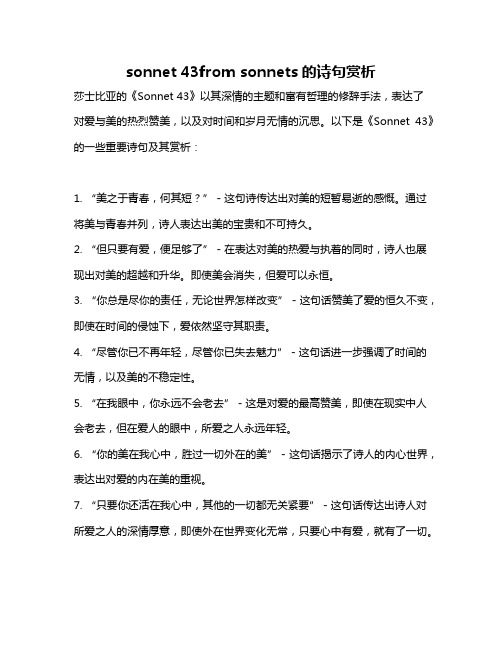
sonnet 43from sonnets的诗句赏析
莎士比亚的《Sonnet 43》以其深情的主题和富有哲理的修辞手法,表达了对爱与美的热烈赞美,以及对时间和岁月无情的沉思。
以下是《Sonnet 43》的一些重要诗句及其赏析:
1. “美之于青春,何其短?” - 这句诗传达出对美的短暂易逝的感慨。
通过将美与青春并列,诗人表达出美的宝贵和不可持久。
2. “但只要有爱,便足够了” - 在表达对美的热爱与执着的同时,诗人也展现出对美的超越和升华。
即使美会消失,但爱可以永恒。
3. “你总是尽你的责任,无论世界怎样改变” - 这句话赞美了爱的恒久不变,即使在时间的侵蚀下,爱依然坚守其职责。
4. “尽管你已不再年轻,尽管你已失去魅力” - 这句话进一步强调了时间的无情,以及美的不稳定性。
5. “在我眼中,你永远不会老去” - 这是对爱的最高赞美,即使在现实中人会老去,但在爱人的眼中,所爱之人永远年轻。
6. “你的美在我心中,胜过一切外在的美” - 这句话揭示了诗人的内心世界,表达出对爱的内在美的重视。
7. “只要你还活在我心中,其他的一切都无关紧要” - 这句话传达出诗人对所爱之人的深情厚意,即使外在世界变化无常,只要心中有爱,就有了一切。
总体来说,《Sonnet 43》以其深情的语言和丰富的情感,赞美了爱的伟大和恒久。
它同时也揭示了诗人对时间和美的独特见解,表达出对现实世界的深深感慨。
sonatine钢琴曲
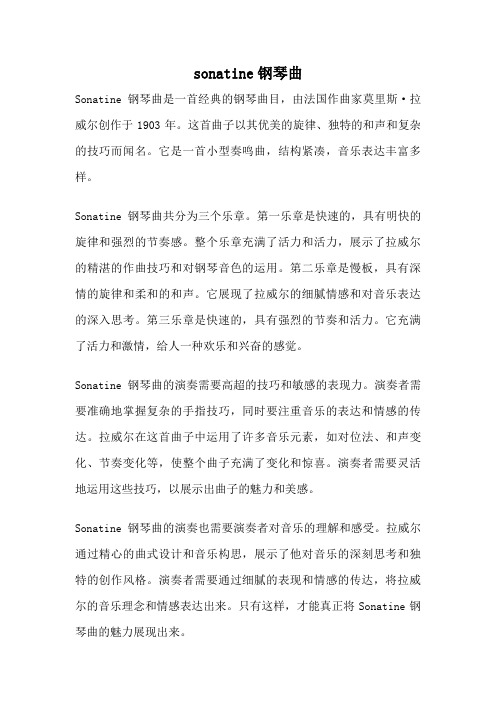
sonatine钢琴曲Sonatine钢琴曲是一首经典的钢琴曲目,由法国作曲家莫里斯·拉威尔创作于1903年。
这首曲子以其优美的旋律、独特的和声和复杂的技巧而闻名。
它是一首小型奏鸣曲,结构紧凑,音乐表达丰富多样。
Sonatine钢琴曲共分为三个乐章。
第一乐章是快速的,具有明快的旋律和强烈的节奏感。
整个乐章充满了活力和活力,展示了拉威尔的精湛的作曲技巧和对钢琴音色的运用。
第二乐章是慢板,具有深情的旋律和柔和的和声。
它展现了拉威尔的细腻情感和对音乐表达的深入思考。
第三乐章是快速的,具有强烈的节奏和活力。
它充满了活力和激情,给人一种欢乐和兴奋的感觉。
Sonatine钢琴曲的演奏需要高超的技巧和敏感的表现力。
演奏者需要准确地掌握复杂的手指技巧,同时要注重音乐的表达和情感的传达。
拉威尔在这首曲子中运用了许多音乐元素,如对位法、和声变化、节奏变化等,使整个曲子充满了变化和惊喜。
演奏者需要灵活地运用这些技巧,以展示出曲子的魅力和美感。
Sonatine钢琴曲的演奏也需要演奏者对音乐的理解和感受。
拉威尔通过精心的曲式设计和音乐构思,展示了他对音乐的深刻思考和独特的创作风格。
演奏者需要通过细腻的表现和情感的传达,将拉威尔的音乐理念和情感表达出来。
只有这样,才能真正将Sonatine钢琴曲的魅力展现出来。
Sonatine钢琴曲在钢琴音乐中具有重要的地位。
它不仅是一首经典的钢琴曲目,也是一部具有独特魅力和艺术价值的作品。
通过演奏和欣赏Sonatine钢琴曲,人们可以感受到音乐的美妙和魅力,体验到艺术的力量和情感的共鸣。
Sonatine钢琴曲是一首优美而精湛的钢琴曲目,它展示了拉威尔的独特创作风格和对音乐的深刻思考。
演奏者需要通过高超的技巧和敏感的表现力,将其音乐魅力展现出来。
同时,通过欣赏Sonatine 钢琴曲,人们可以感受到音乐的美妙和艺术的力量。
让我们一起沉浸在这美妙的音乐中,感受音乐的魅力和艺术的力量。
shakespeare(sonnet) 英国文学 十四行诗

Iambic pentameter
1 2 3 4 5
•
•
•
•
U / U / U / U / U / One day I wrote her name u pon the strand, U / U / U / U/U / But came the waves and wash ed it a way: U / U / U / U / U / A gain I wrote it with a sec ond hand, U / U / U / U / U / But came the tide, and made my pains his prey
A sonnet is
• • • • • a lyric poem consisting of fourteen lines written in iambic pentameter with a definite rime scheme and a definite tho夏日? 你可是更加可爱,更加温婉; 狂风会吹落五月里开的好花儿, 夏季租出的日子又未免太短暂:
Paraphrasing:
• Quatrain 1: Shall I compare you to a day in summer that is very beautiful here in England? Yet this comparison is not sufficient, because you are more beautiful and less extreme than the summer. The winds of summer are rough on the budding life, and the duration of summer usually does not last very long.
十四行诗英汉双语Sonnets1-10

From fairest creatures we desire increase,That thereby beauty's rose might never die,But as the riper should by time decease,His tender heir might bear his memory;But thou, contracted to thine own bright eyes,Feed'st thy light's flame with substantial fuel,Making a famine where abundance lies,Thyself thy foe, to thy sweet self too cruel.Thou that art now the world's fresh ornamentAnd only herald to the gaudy springWithin thine own bud buriest thy content,And, tender churl, mak'st waste in niggarding.Pity the world, or else this glutton be:To eat the world's due, by the grave and thee.By William Shakespeare(威廉莎士比亚)一我们总愿美的物种繁衍昌盛,好让美的玫瑰永远也不凋零。
纵然时序难逆,物壮必老,自有年轻的子孙来一脉相承。
而你,却只与自己的明眸订婚,焚身为火,好烧出眼中的光明。
你与自我为敌,作践可爱的自身,有如在丰饶之乡偏造成满地饥民。
你是当今世界鲜美的装饰,你是锦绣春光里报春的先行。
你用自己的花苞埋葬了自己的花精,如慷慨的吝啬者用吝啬将血本赔尽。
十四行诗中古英语词汇

十四行诗中古英语词汇十四行诗,又称为“sonnet”,是一种特定结构和韵律的诗歌形式,起源于14世纪的意大利文学,并在英国文学中得到广泛的运用。
十四行诗通常由四个四行的节(quatrains)和一个以两个行组成的双行结尾构成。
在这个独特的诗歌形式中,有许多古英语词汇广泛应用。
1. Deftly(灵巧地)这一词汇在十四行诗中经常用来形容某种技能或行为的灵巧和熟练。
例如,“She deftly danced across the stage”(她灵巧地穿梭在舞台上)。
2. Ere(以前)在十四行诗中,词汇“ere”可用来表示过去的时间。
它可以与其他古英语词汇和现代英语单词组合使用,以创造一种典雅而传统的氛围。
例如,“Ere the sun sets, we shall meet again”(在太阳落山之前,我们必将再次相遇)。
3. Hither(这里)十四行诗中,词汇“hither”通常用来表示位置或移动的方向。
它可以代指一个地点或表达某人某物迎接另一方的意图。
例如,“Come hither, my love"(来吧,我的爱)。
4. Whence(从哪里)这个古英语词汇在十四行诗中常用来表示来源或起源。
它用来表达一个地点或事物的位置或出处。
例如,“Whence cometh the wind, no one knows”(风从哪里来,无人知晓)。
5. Thine(你的)在十四行诗中,人称代词“thine”常用于叙述诗人的情感或对某事物的称颂。
它与现代英语中的“your”具有相同的含义,但使用“thine”可以让诗歌更富于古典和浪漫的氛围。
例如,“I gaze upon thine eyes, filled with love”(我凝视着你充满爱意的眼睛)。
6. Whenceforth(从那时起)“Whenceforth”这个词汇在十四行诗中用来表示一个过程或一个时间段从何时开始,起始的地方或时刻。
英语诗歌-鉴赏莎士比亚Sonnet 3
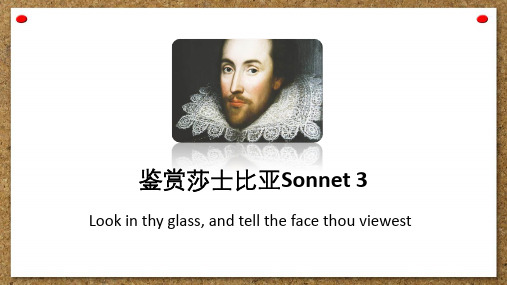
What are Shakespeare’s sonnets about?
• Shakespeare’s sonnets can be broken down into three subcategories according to themes. • Since it is not known who organized his sonnets, either Shakespeare grouped his sonnets
Sonnet III
The First Quatrain
• Look at yourself in the mirror, and tell me what you see in it. Now it is the time for the change of face. If now you do not renew your beauty, you are making the whole world unhappy, depriving some mother of a blessing.
• The last two lines of a sonnet make of the Couplet. It should serve as a conclusion to the sonnet. This often leaves the reader with an image of some sort.
purposely according to their themes or the publisher went through them, recognized the themes, and ordered them according to their relevance. • Sonnets 1-17 have a common theme of procreating. • Sonnets 1-126 are all addressed to a young man. • Sonnets 127-154 share the theme of a dark lady.
Sonnet
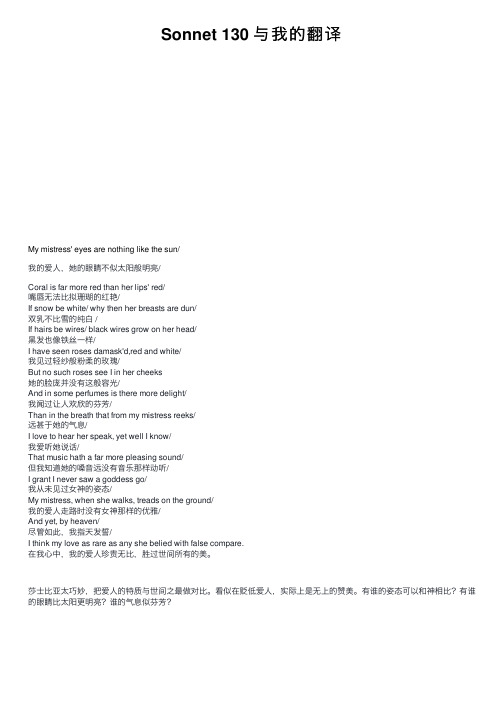
Sonnet 130 与我的翻译My mistress' eyes are nothing like the sun/我的爱⼈,她的眼睛不似太阳般明亮/Coral is far more red than her lips' red/嘴唇⽆法⽐拟珊瑚的红艳/If snow be white/ why then her breasts are dun/双乳不⽐雪的纯⽩ /If hairs be wires/ black wires grow on her head/⿊发也像铁丝⼀样/I have seen roses damask'd,red and white/我见过轻纱般粉柔的玫瑰/But no such roses see I in her cheeks她的脸庞并没有这般容光/And in some perfumes is there more delight/我闻过让⼈欢欣的芬芳/Than in the breath that from my mistress reeks/远甚于她的⽓息/I love to hear her speak, yet well I know/我爱听她说话/That music hath a far more pleasing sound/但我知道她的嗓⾳远没有⾳乐那样动听/I grant I never saw a goddess go/我从未见过⼥神的姿态/My mistress, when she walks, treads on the ground/我的爱⼈⾛路时没有⼥神那样的优雅/And yet, by heaven/尽管如此,我指天发誓/I think my love as rare as any she belied with false compare.在我⼼中,我的爱⼈珍贵⽆⽐,胜过世间所有的美。
莎⼠⽐亚太巧妙,把爱⼈的特质与世间之最做对⽐。
sonnect1格律划分
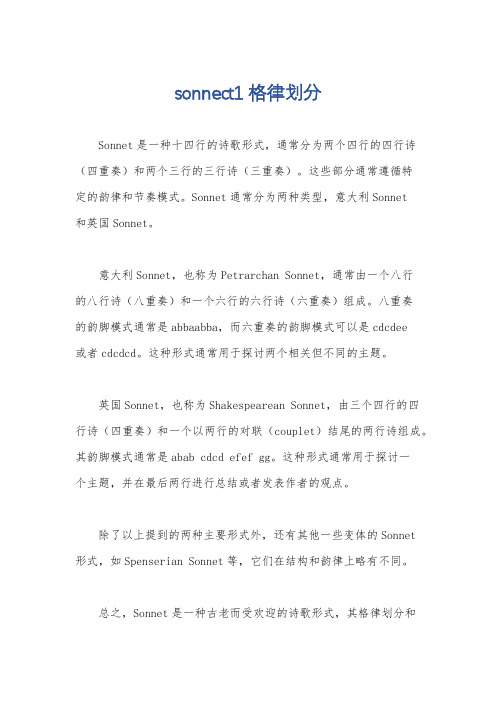
sonnect1格律划分
Sonnet是一种十四行的诗歌形式,通常分为两个四行的四行诗(四重奏)和两个三行的三行诗(三重奏)。
这些部分通常遵循特
定的韵律和节奏模式。
Sonnet通常分为两种类型,意大利Sonnet
和英国Sonnet。
意大利Sonnet,也称为Petrarchan Sonnet,通常由一个八行
的八行诗(八重奏)和一个六行的六行诗(六重奏)组成。
八重奏
的韵脚模式通常是abbaabba,而六重奏的韵脚模式可以是cdcdee
或者cdcdcd。
这种形式通常用于探讨两个相关但不同的主题。
英国Sonnet,也称为Shakespearean Sonnet,由三个四行的四
行诗(四重奏)和一个以两行的对联(couplet)结尾的两行诗组成。
其韵脚模式通常是abab cdcd efef gg。
这种形式通常用于探讨一
个主题,并在最后两行进行总结或者发表作者的观点。
除了以上提到的两种主要形式外,还有其他一些变体的Sonnet
形式,如Spenserian Sonnet等,它们在结构和韵律上略有不同。
总之,Sonnet是一种古老而受欢迎的诗歌形式,其格律划分和
韵律模式对于诗人来说是非常重要的,因为它们帮助诗人在有限的空间内表达复杂的思想和情感。
3十四行诗
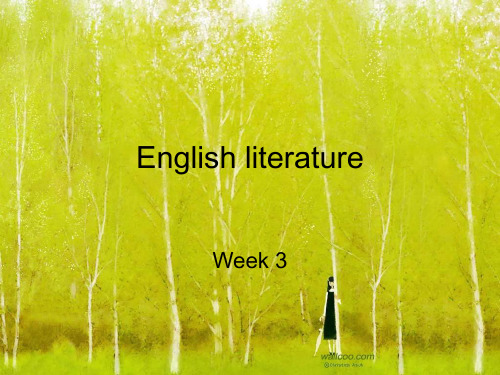
• 辜正坤译
Homework
• 1. recite a sonnet • 2. read: life and major works of Shakespeare • 3. get familiar with the plot of Hamlet
பைடு நூலகம் •
•
我是怎样的爱你?诉不尽万语千言: 我爱你的程度是那样地高深和广远, 恰似我的灵魂曾飞到了九天与黄泉, 去探索人生的奥妙,和神灵的恩典。 无论是白昼还是夜晚,我爱你不息, 像我每日必需的摄生食物不能间断。 我纯洁地爱你,不为奉承吹捧迷惑, 我勇敢地爱你,如同为正义而奋争! 爱你,以昔日的剧痛和童年的忠诚, 爱你,以眼泪、笑声及全部的生命。 要是没有你,我的心就失去了圣贤, 要是没有你,我的心就失去了激情。 假如上帝愿意,请为我作主和见证: 在我死后,我必将爱你更深,更深! ——袁广达 梁葆成译
• • • • • • • • • • • •
Yet in these thoughts myself almost despising, 我正耽于这种妄自菲薄的思想, Haply I think on thee, and then my state, 猛然间想到了你,顿时景换情迁, Like to the lark at break of day arising 我忽如破晓的云雀凌空振翅, From sullen earth, sings hymns at heaven‘s gate 讴歌直上天门,把苍茫大地俯瞰。 For thy sweet love remembered such wealth brings, 但记住你柔情招来财无限, That then I scorn to change my state with kings. 纵帝王屈尊就我,不与换江山。
三家进口人工耳蜗最新数据对比表

CI532:8.6 CI512/CI522:8.8 CI24RE:9.5
SYNCHRONY:7.6 CONCERT:7.6 SONATA:8.6
单位:mm(毫米) 表中数据单位均为mm(毫米)
重量单位为g(克)
植入体封装材料 植入体抗冲击性
可拆卸磁铁
钛合金
HiRes Ultra:2.5J Advantage:6.0J HiRes 90K:6.0J
Nucleus 7:四个 Kanso:四个
SONNET:四个 RONDO:四个
声音处理器包括助听器功能的使用与保存
Naída CI Q90:支持
Nucleus 7:支持
SONNET:支持
残 余 听 力 的 能 力 , AB 与 MED-
Neptune:不支持
Kanso:不支持
RONDO:不支持
EL将组合的CI/HA称为“电声刺激(EAS)
美国专利 全球市场份额
总部位置
植入体
刺激速率
589
592
20%
AB:1993年美国加利福尼亚 索诺瓦集团:1947年瑞士
HiRes Ultra HiRes 90K Advantage
HiRes 90k
55%
1981年澳大利亚
CI532 Slim Modiolar CI512 Contour Advance
HiRes Ultra:3.5-4.0 Advantage:2.5 HiRes 90K:2.5
HiRes Ultra:4.5 Advantage:5.5 HiRes 90K:5.5
植入体重量
HiRes Ultra:10.0 Advantage:12.0 HiRes 90K:12.0
sonnet名词解释
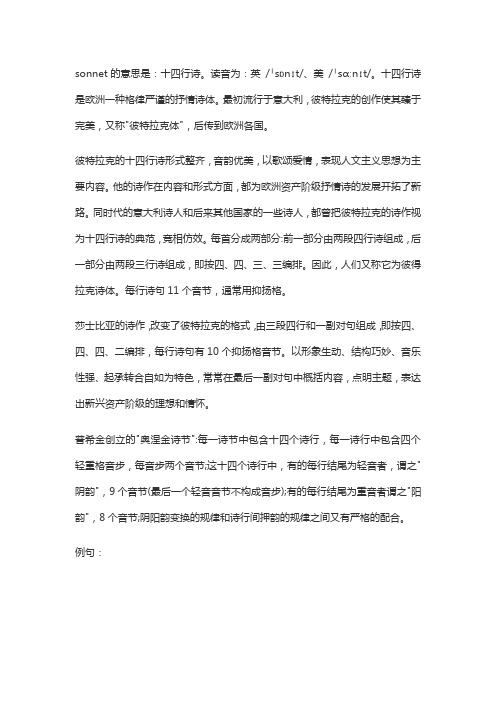
sonnet的意思是:十四行诗。
读音为:英/ˈsɒnɪt/、美/ˈsɑːnɪt/。
十四行诗是欧洲一种格律严谨的抒情诗体。
最初流行于意大利,彼特拉克的创作使其臻于完美,又称"彼特拉克体",后传到欧洲各国。
彼特拉克的十四行诗形式整齐,音韵优美,以歌颂爱情,表现人文主义思想为主要内容。
他的诗作在内容和形式方面,都为欧洲资产阶级抒情诗的发展开拓了新路。
同时代的意大利诗人和后来其他国家的一些诗人,都曾把彼特拉克的诗作视为十四行诗的典范,竞相仿效。
每首分成两部分:前一部分由两段四行诗组成,后一部分由两段三行诗组成,即按四、四、三、三编排。
因此,人们又称它为彼得拉克诗体。
每行诗句11个音节,通常用抑扬格。
莎士比亚的诗作,改变了彼特拉克的格式,由三段四行和一副对句组成,即按四、四、四、二编排,每行诗句有10个抑扬格音节。
以形象生动、结构巧妙、音乐性强、起承转合自如为特色,常常在最后一副对句中概括内容,点明主题,表达出新兴资产阶级的理想和情怀。
普希金创立的"奥涅金诗节":每一诗节中包含十四个诗行,每一诗行中包含四个轻重格音步,每音步两个音节;这十四个诗行中,有的每行结尾为轻音者,谓之"阴韵",9个音节(最后一个轻音音节不构成音步);有的每行结尾为重音者谓之"阳韵",8个音节;阴阳韵变换的规律和诗行间押韵的规律之间又有严格的配合。
例句:1.The sonnet, along with other Italian forms, was introduced to England in the sixteenth century by Sir Thomas Wyatt. 16世纪初,十四行诗连同其他一些意大利文学形式,由托马斯·怀特引入英格兰。
2.The composer set a sonnet to music. 作曲家为一首十四行诗谱了曲。
珍妮扬森圣桑第三小提琴协奏曲
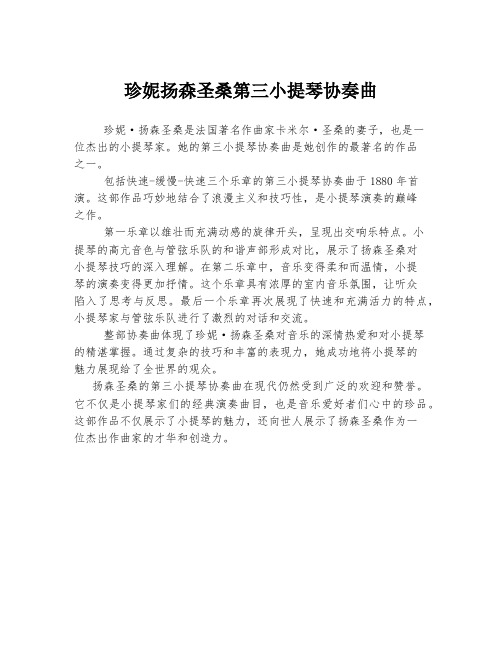
珍妮扬森圣桑第三小提琴协奏曲
珍妮·扬森圣桑是法国著名作曲家卡米尔·圣桑的妻子,也是一
位杰出的小提琴家。
她的第三小提琴协奏曲是她创作的最著名的作品
之一。
包括快速-缓慢-快速三个乐章的第三小提琴协奏曲于1880年首演。
这部作品巧妙地结合了浪漫主义和技巧性,是小提琴演奏的巅峰
之作。
第一乐章以雄壮而充满动感的旋律开头,呈现出交响乐特点。
小
提琴的高亢音色与管弦乐队的和谐声部形成对比,展示了扬森圣桑对
小提琴技巧的深入理解。
在第二乐章中,音乐变得柔和而温情,小提
琴的演奏变得更加抒情。
这个乐章具有浓厚的室内音乐氛围,让听众
陷入了思考与反思。
最后一个乐章再次展现了快速和充满活力的特点,小提琴家与管弦乐队进行了激烈的对话和交流。
整部协奏曲体现了珍妮·扬森圣桑对音乐的深情热爱和对小提琴
的精湛掌握。
通过复杂的技巧和丰富的表现力,她成功地将小提琴的
魅力展现给了全世界的观众。
扬森圣桑的第三小提琴协奏曲在现代仍然受到广泛的欢迎和赞誉。
它不仅是小提琴家们的经典演奏曲目,也是音乐爱好者们心中的珍品。
这部作品不仅展示了小提琴的魅力,还向世人展示了扬森圣桑作为一
位杰出作曲家的才华和创造力。
十字军之王3优美诗歌
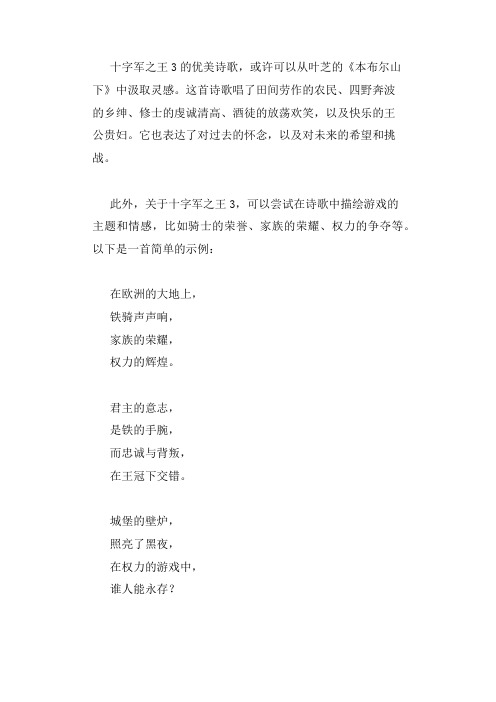
十字军之王3的优美诗歌,或许可以从叶芝的《本布尔山下》中汲取灵感。
这首诗歌唱了田间劳作的农民、四野奔波
的乡绅、修士的虔诚清高、酒徒的放荡欢笑,以及快乐的王
公贵妇。
它也表达了对过去的怀念,以及对未来的希望和挑战。
此外,关于十字军之王3,可以尝试在诗歌中描绘游戏的
主题和情感,比如骑士的荣誉、家族的荣耀、权力的争夺等。
以下是一首简单的示例:
在欧洲的大地上,
铁骑声声响,
家族的荣耀,
权力的辉煌。
君主的意志,
是铁的手腕,
而忠诚与背叛,
在王冠下交错。
城堡的壁炉,
照亮了黑夜,
在权力的游戏中,
谁人能永存?。
ravel sonatine 第三乐章曲式
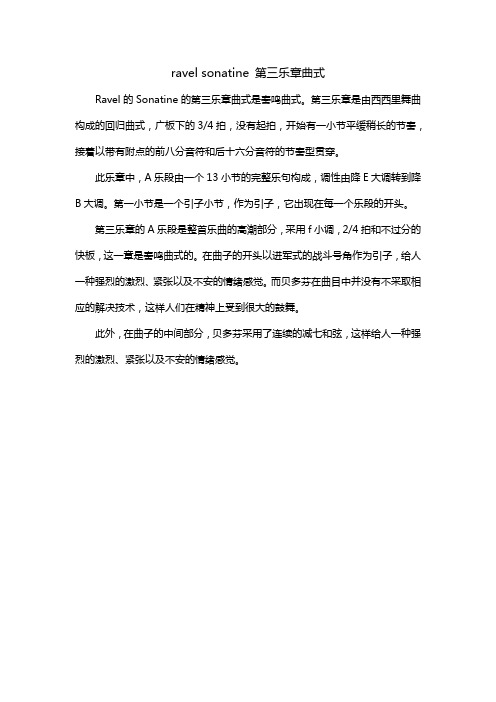
ravel sonatine 第三乐章曲式
Ravel的Sonatine的第三乐章曲式是奏鸣曲式。
第三乐章是由西西里舞曲构成的回归曲式,广板下的3/4拍,没有起拍,开始有一小节平缓稍长的节奏,接着以带有附点的前八分音符和后十六分音符的节奏型贯穿。
此乐章中,A乐段由一个13小节的完整乐句构成,调性由降E大调转到降B大调。
第一小节是一个引子小节,作为引子,它出现在每一个乐段的开头。
第三乐章的A乐段是整首乐曲的高潮部分,采用f小调,2/4拍和不过分的快板,这一章是奏鸣曲式的。
在曲子的开头以进军式的战斗号角作为引子,给人一种强烈的激烈、紧张以及不安的情绪感觉。
而贝多芬在曲目中并没有不采取相应的解决技术,这样人们在精神上受到很大的鼓舞。
此外,在曲子的中间部分,贝多芬采用了连续的减七和弦,这样给人一种强烈的激烈、紧张以及不安的情绪感觉。
雪莱十四行诗

雪莱十四行诗1.小编简介我叫小编,是一名文章生成器。
今天我将为大家生成一篇以“雪莱十四行诗”为标题的文章。
2.什么是雪莱十四行诗雪莱十四行诗(Sonnet),是指由十四行组成的一种诗体,源于意大利文艺复兴时期,后传入英国。
在英国文学史上,雪莱(Percy Bysshe Shelley)以写十四行诗而著名。
雪莱的十四行诗处理各种主题,包括爱情、政治和宗教等。
3.雪莱的生平雪莱是一位英国诗人,被誉为浪漫主义诗歌的杰出代表。
他的父亲是一位富有的贵族,母亲则是一位社交界名媛。
雪莱自幼聪明好学,十八岁时入读牛津大学。
他热爱文学,从小就开始创作诗歌。
他的诗歌大多写反对不平等、追求理想的主题。
4.雪莱十四行诗的特点雪莱十四行诗的首行和第三行、第九行和第十二行押韵,且所有行都有十个音节,符合英语十四行诗的传统要求。
雪莱的诗歌以语言清新、思想深邃、意象丰富、情感强烈著称,对后来的诗歌影响深远。
5.雪莱十四行诗创作举例以下是雪莱的一首十四行诗的摘录,题目是《西风颂》,通过描写自然风景表达人类的情感和哲思:“西风啊,你吹过秋天的枯叶,你把花儿吹得满地红颜血色。
你把北极的大雪吹向南方,你把大海吹起了惊涛骇浪。
你吹荡了我的思绪和情感,像浮云一样,轻盈而不安分。
我听到你运筹帷幄的声音,像一位孤独的诗人在歌唱”。
6.结语以上就是有关雪莱十四行诗的介绍。
雪莱的诗歌既流畅又富有思想,是人类文学创作中的珍品。
相信通过学习雪莱的诗歌,能够让我们更好地理解和珍视文学遗产。
勃朗宁夫人十四诗第三首

勃朗宁夫人十四行诗第三首如下:
我们原不一样,尊贵的人儿呀,
原不一样是我们的职司和前程。
你头上的天使,迎面飞来,
翅膀碰上了翅膀,彼此瞪着惊愕的眼睛。
你想,你是华宫里后妃的上宾,
千百双殷勤的明眸(哪怕挂满了泪珠,
也不能教我的眼有这份光彩)请求你担任领唱。
那你干什么从那灯光辉映的纱窗,
探出头来,再把那凄哀的贡多拉的歌声
吸进去,又摒住呼吸,
让那些歌声在喉头死去?
你又怎么把我变成了你的战利品?
你什么时候从我的心上摘下了这爱的徽章?
你是怎样俯身把坟墓掩遮,
当你没忘了还要在夜莺的鸟巢里
藏下你那珍珠的小鸟!
以上是勃朗宁夫人十四行诗第三首的内容,希望您能够满意。
莎士比亚129首诗
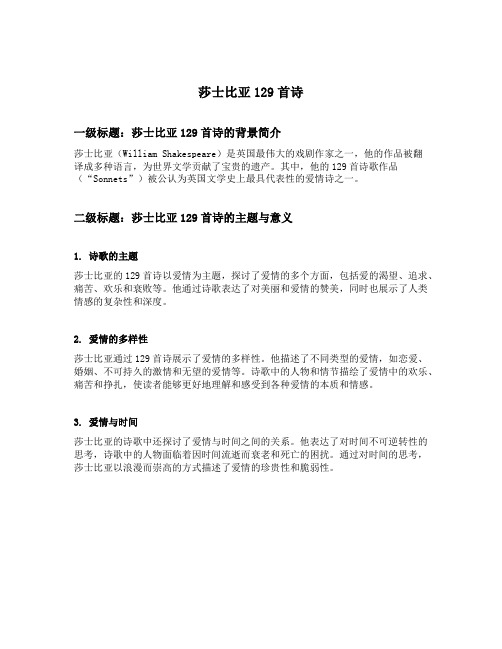
莎士比亚129首诗一级标题:莎士比亚129首诗的背景简介莎士比亚(William Shakespeare)是英国最伟大的戏剧作家之一,他的作品被翻译成多种语言,为世界文学贡献了宝贵的遗产。
其中,他的129首诗歌作品(“Sonnets”)被公认为英国文学史上最具代表性的爱情诗之一。
二级标题:莎士比亚129首诗的主题与意义1. 诗歌的主题莎士比亚的129首诗以爱情为主题,探讨了爱情的多个方面,包括爱的渴望、追求、痛苦、欢乐和衰败等。
他通过诗歌表达了对美丽和爱情的赞美,同时也展示了人类情感的复杂性和深度。
2. 爱情的多样性莎士比亚通过129首诗展示了爱情的多样性。
他描述了不同类型的爱情,如恋爱、婚姻、不可持久的激情和无望的爱情等。
诗歌中的人物和情节描绘了爱情中的欢乐、痛苦和挣扎,使读者能够更好地理解和感受到各种爱情的本质和情感。
3. 爱情与时间莎士比亚的诗歌中还探讨了爱情与时间之间的关系。
他表达了对时间不可逆转性的思考,诗歌中的人物面临着因时间流逝而衰老和死亡的困扰。
通过对时间的思考,莎士比亚以浪漫而崇高的方式描述了爱情的珍贵性和脆弱性。
二级标题:具有代表性的莎士比亚129首诗1. Sonnet 18此诗是莎士比亚最著名和最广为人知的诗歌之一。
它以美丽和永恒的爱情为主题,描述了诗人对他的恋人的无尽赞美和爱慕。
莎士比亚通过比喻、象征和修辞等手法,探讨了时间对爱情的影响和爱情的持久性。
2. Sonnet 116这首诗强调了真正的爱情是坚固、不受时间和困难的摧毁。
莎士比亚通过对爱情的浪漫和理性的深思熟虑,表达了爱情的纯洁性和可靠性。
3. Sonnet 130这首诗与传统的爱情诗相比,展示了莎士比亚对现实的勇敢面对。
他描述了他的恋人的缺点和不完美之处,以对抗传统上对美的标准化。
这首诗捕捉到现实生活中的爱情,并用坦诚和幽默的方式表达了深情。
4. Sonnet 29这首诗描绘了一个在困境中的人,他感到失意和不被接受。
- 1、下载文档前请自行甄别文档内容的完整性,平台不提供额外的编辑、内容补充、找答案等附加服务。
- 2、"仅部分预览"的文档,不可在线预览部分如存在完整性等问题,可反馈申请退款(可完整预览的文档不适用该条件!)。
- 3、如文档侵犯您的权益,请联系客服反馈,我们会尽快为您处理(人工客服工作时间:9:00-18:30)。
Sonnet 3Look in thy glass, and tell the face thou viewest Now is the time that face should form another; Whose fresh repair if now thou not renewest,Thou dost beguile the world, unbless some mother. For where is she so fair whose unear'd womb Disdains the tillage of thy husbandry?Or who is he so fond will be the tomb,Of his self-love, to stop posterity?Thou art thy mother's glass, and she in theeCalls back the lovely April of her prime;So thou through windows of thine age shalt see, Despite of wrinkles, this thy golden time.But if thou live, remember'd not to be,Die single, and thine image dies with thee. Sonnet 12When I do count the clock that tells the time,And see the brave day sunk in hideous night; When I behold the violet past prime,And sable curls, all silvered o'er with white;When lofty trees I see barren of leaves,Which erst from heat did canopy the herd,And summer's green all girded up in sheaves, Borne on the bier with white and bristly beard, Then of thy beauty do I question make,That thou among the wastes of time must go, Since sweets and beauties do themselves forsake And die as fast as they see others grow;And nothing 'gainst Time's scythe can make defence Save breed, to brave him when he takes thee hence. Sonnet 15When I consider every thing that growsHolds in perfection but a little moment,That this huge stage presenteth nought but shows Whereon the stars in secret influence comment; When I perceive that men as plants increase, Cheered and checked even by the self-same sky, Vaunt in their youthful sap, at height decrease,And wear their brave state out of memory;Then the conceit of this inconstant staySets you most rich in youth before my sight, Where wasteful Time debateth with decayTo change your day of youth to sullied night,And all in war with Time for love of you,As he takes from you, I engraft you new.Sonnet 18 Shall I compare thee to a summer's day?Thou art more lovely and more temperate:Rough winds do shake the darling buds of May, And summer's lease hath all too short a date: Sometime too hot the eye of heaven shines,And often is his gold complexion dimm'd,And every fair from fair sometime declines,By chance, or nature's changing course untrimm'd: But thy eternal summer shall not fade,Nor lose possession of that fair thou ow'st,Nor shall death brag thou wander'st in his shade, When in eternal lines to time thou grow'st,So long as men can breathe, or eyes can see,So long lives this, and this gives life to thee. Sonnet 19Devouring Time, blunt thou the lion's paws,And make the earth devour her own sweet brood; Pluck the keen teeth from the fierce tiger's jaws, And burn the long-liv'd phoenix, in her blood; Make glad and sorry seasons as thou fleets,And do whate'er thou wilt, swift-footed Time,To the wide world and all her fading sweets;But I forbid thee one most heinous crime:O! carve not with thy hours my love's fair brow,Nor draw no lines there with thine antique pen;Him in thy course untainted do allowFor beauty's pattern to succeeding men.Yet, do thy worst old Time: despite thy wrong,My love shall in my verse ever live young.Sonnet 20A woman's face with nature's own hand painted, Hast thou, the master mistress of my passion;A woman's gentle heart, but not acquaintedWith shifting change, as is false women's fashion: An eye more bright than theirs, less false in rolling, Gilding the object whereupon it gazeth;A man in hue all 'hues' in his controlling,Which steals men's eyes and women's souls amazeth. And for a woman wert thou first created;Till Nature, as she wrought thee, fell a-doting,And by addition me of thee defeated,By adding one thing to my purpose nothing.But since she prick'd thee out for women's pleasure, Mine be thy love and thy love's use their treasure. Sonnet 29When in disgrace with fortune and men's eyesI all alone beweep my outcast state,And trouble deaf heaven with my bootless cries,And look upon myself, and curse my fate,Wishing me like to one more rich in hope,Featur'd like him, like him with friends possess'd, Desiring this man's art, and that man's scope,With what I most enjoy contented least;Yet in these thoughts my self almost despising,Haply I think on thee,—and then my state,Like to the lark at break of day arisingFrom sullen earth, sings hymns at heaven's gate;For thy sweet love remember'd such wealth brings That then I scorn to change my state with kings. Sonnet 30When to the sessions of sweet silent thoughtI summon up remembrance of things past,I sigh the lack of many a thing I sought,And with old woes new wail my dear time's waste: Then can I drown an eye, unused to flow,For precious friends hid in death's dateless night,And weep afresh love's long since cancell'd woe,And moan the expense of many a vanish'd sight:Then can I grieve at grievances foregone,And heavily from woe to woe tell o'erThe sad account of fore-bemoaned moan,Which I new pay as if not paid before.But if the while I think on thee, dear friend,All losses are restor'd and sorrows end.Sonnet 33Full many a glorious morning have I seenFlatter the mountain tops with sovereign eye,Kissing with golden face the meadows green,Gilding pale streams with heavenly alchemy;Anon permit the basest clouds to rideWith ugly rack on his celestial face,And from the forlorn world his visage hide,Stealing unseen to west with this disgrace:Even so my sun one early morn did shine,With all triumphant splendour on my brow;But out! alack! he was but one hour mine,The region cloud hath mask'd him from me now.Yet him for this my love no whit disdaineth;Suns of the world may stain when heaven's sun staineth.Sonnet 35No more be griev'd at that which thou hast done: Roses have thorns, and silver fountains mud:Clouds and eclipses stain both moon and sun,And loathsome canker lives in sweetest bud. All men make faults, and even I in this, Authorizing thy trespass with compare,Myself corrupting, salving thy amiss,Excusing thy sins more than thy sins are;For to thy sensual fault I bring in sense,—Thy adverse party is thy advocate,—And 'gainst myself a lawful plea commence:Such civil war is in my love and hate,That I an accessary needs must be,To that sweet thief which sourly robs from me. Sonnet 55Not marble, nor the gilded monumentsOf princes, shall outlive this powerful rhyme;But you shall shine more bright in these contents Than unswept stone, besmear'd with sluttish time. When wasteful war shall statues overturn,And broils root out the work of masonry,Nor Mars his sword, nor war's quick fire shall burn The living record of your memory.'Gainst death, and all-oblivious enmityShall you pace forth; your praise shall still find room Even in the eyes of all posterityThat wear this world out to the ending doom.So, till the judgment that yourself arise,You live in this, and dwell in lovers' eyes.Sonnet 60Like as the waves make towards the pebbled shore, So do our minutes hasten to their end;Each changing place with that which goes before,In sequent toil all forwards do contend.Nativity, once in the main of light,Crawls to maturity, wherewith being crown'd, Crooked eclipses 'gainst his glory fight,And Time that gave doth now his gift confound. Time doth transfix the flourish set on youthAnd delves the parallels in beauty's brow,Feeds on the rarities of nature's truth,And nothing stands but for his scythe to mow:And yet to times in hope, my verse shall stand. Praising thy worth, despite his cruel hand.Sonnet 65Since brass, nor stone, nor earth, nor boundless sea But sad mortality o'ersways their power,How with this rage shall beauty hold a plea, Whose action is no stronger than a flower?O, how shall summer's honey breath hold outAgainst the wrackful siege of batt'ring days,When rocks impregnable are not so stout,Nor gates of steel so strong, but Time decays?O fearful meditation! where, alack,Shall Time's best jewel from Time's chest lie hid?Or what strong hand can hold his swift foot back?Or who his spoil of beauty can forbid?O, none, unless this miracle have might,That in black ink my love may still shine bright.Sonnet 71No longer mourn for me when I am deadThan you shall hear the surly sullen bellGive warning to the world that I am fledFrom this vile world with vilest worms to dwell: Nay, if you read this line, remember notThe hand that writ it, for I love you so,That I in your sweet thoughts would be forgot,If thinking on me then should make you woe.O! if,— I say you look upon this verse,When I perhaps compounded am with clay,Do not so much as my poor name rehearse;But let your love even with my life decay;Lest the wise world should look into your moan,And mock you with me after I am gone.Sonnet 73That time of year thou mayst in me beholdWhen yellow leaves, or none, or few, do hangUpon those boughs which shake against the cold,Bare ruin'd choirs, where late the sweet birds sang.In me thou see'st the twilight of such dayAs after sunset fadeth in the west;Which by and by black night doth take away,Death's second self, that seals up all in rest.In me thou see'st the glowing of such fire,That on the ashes of his youth doth lie,As the death-bed, whereon it must expire,Consum'd with that which it was nourish'd by.This thou perceiv'st, which makes thy love more strong, To love that well, which thou must leave ere long. Sonnet 74But be contented: when that fell arrestWithout all bail shall carry me away,My life hath in this line some interest,Which for memorial still with thee shall stay.When thou reviewest this, thou dost reviewThe very part was consecrate to thee: The earth can have but earth, which is his due;My spirit is thine, the better part of me:So then thou hast but lost the dregs of life,The prey of worms, my body being dead;The coward conquest of a wretch's knife,Too base of thee to be remembered.The worth of that is that which it contains,And that is this, and this with thee remains.Sonnet 87Farewell! thou art too dear for my possessing,And like enough thou know'st thy estimate,The charter of thy worth gives thee releasing:My bonds in thee are all determinate.For how do I hold thee but by thy granting,And for that riches where is my deserving?The cause of this fair gift in me is wanting,And so my patent back again is swerving.Thy self thou gav'st, thy own worth then not knowing, Or me to whom thou gav'st it, else mistaking,So thy great gift, upon misprision growing,Comes home again, on better judgement making. Thus have I had thee as a dream doth flatter,In sleep a King, but waking no such matter.Sonnet94They that have power to hurt, and will do none,That do not do the thing they most do show,Who, moving others, are themselves as stone, Unmoved, cold, and to temptation slow;They rightly do inherit heaven's graces,And husband nature's riches from expense;They are the lords and owners of their faces, Others, but stewards of their excellence.The summer's flower is to the summer sweet, Though to itself, it only live and die,But if that flower with base infection meet,The basest weed outbraves his dignity:For sweetest things turn sourest by their deeds;Lilies that fester, smell far worse than weeds. Sonnet97How like a winter hath my absence beenFrom thee, the pleasure of the fleeting year!What freezings have I felt, what dark days seen! What old December's bareness everywhere!And yet this time removed was summer's time;The teeming autumn, big with rich increase, Bearing the wanton burden of the prime,Like widow'd wombs after their lords' decease: Yet this abundant issue seem'd to meBut hope of orphans, and unfather'd fruit;For summer and his pleasures wait on thee, And, thou away, the very birds are mute:Or, if they sing, 'tis with so dull a cheer,That leaves look pale, dreading the winter's near.Sonnet106When in the chronicle of wasted timeI see descriptions of the fairest wights,And beauty making beautiful old rime,In praise of ladies dead and lovely knights, Then, in the blazon of sweet beauty's best,Of hand, of foot, of lip, of eye, of brow,I see their antique pen would have express'd Even such a beauty as you master now.So all their praises are but propheciesOf this our time, all you prefiguring;And for they looked but with divining eyes, They had not skill enough your worth to sing: For we, which now behold these present days, Have eyes to wonder, but lack tongues to praise.Sonnet107Not mine own fears, nor the prophetic soulOf the wide world dreaming on things to come, Can yet the lease of my true love control, Supposed as forfeit to a confin'd doom.The mortal moon hath her eclipse endur'd,And the sad augurs mock their own presage; Incertainties now crown themselves assur'd,And peace proclaims olives of endless age.Now with the drops of this most balmy time,My love looks fresh, and Death to me subscribes, Since, spite of him, I'll live in this poor rime, While he insults o'er dull and speechless tribes:And thou in this shalt find thy monument, When tyrants' crests and tombs of brass are spent.Sonnet116Let me not to the marriage of true mindsAdmit impediments. Love is not loveWhich alters when it alteration finds,Or bends with the remover to remove:O, no! it is an ever-fixèd mark,That looks on tempests and is never shaken;It is the star to every wandering bark, Whose worth’s unknown, although his height be taken. Love’s not Time’s fool, though rosy lips and cheeks Within his bending sickle’s compass come;Love alters not with his brief hours and weeks,But bears it out even to the edge of doom.If this be error and upon me proved,I never writ, nor no man ever loved.Sonnet129The expense of spirit in a waste of shameIs lust in action: and till action, lustIs perjur'd, murderous, bloody, full of blame, Savage, extreme, rude, cruel, not to trust;Enjoy'd no sooner but despised straight;Past reason hunted; and no sooner had,Past reason hated, as a swallow'd bait,On purpose laid to make the taker mad:Mad in pursuit and in possession so;Had, having, and in quest, to have extreme;A bliss in proof,— and prov'd, a very woe;Before, a joy propos'd; behind a dream.All this the world well knows; yet none knows well To shun the heaven that leads men to this hell. Sonnet130My mistress' eyes are nothing like the sun;Coral is far more red, than her lips red:If snow be white, why then her breasts are dun;If hairs be wires, black wires grow on her head.I have seen roses damask'd, red and white,But no such roses see I in her cheeks;And in some perfumes is there more delightThan in the breath that from my mistress reeks.I love to hear her speak, yet well I knowThat music hath a far more pleasing sound:I grant I never saw a goddess go,—My mistress, when she walks, treads on the ground: And yet by heaven, I think my love as rare,As any she belied with false compare.Sonnet135Whoever hath her wish, thou hast thy 'Will,'And 'Will' to boot, and 'Will' in over-plus;More than enough am I that vex'd thee still,To thy sweet will making addition thus.Wilt thou, whose will is large and spacious,Not once vouchsafe to hide my will in thine?Shall will in others seem right gracious,And in my will no fair acceptance shine?The sea, all water, yet receives rain still,And in abundance addeth to his store;So thou, being rich in 'Will,' add to thy 'Will' One will of mine, to make thy large will more.Let no unkind 'No' fair beseechers kill;Think all but one, and me in that one 'Will.'Sonnet138When my love swears that she is made of truth, I do believe her though I know she lies,That she might think me some untutor'd youth, Unlearned in the world's false subtleties. Thus vainly thinking that she thinks me young, Although she knows my days are past the best, Simply I credit her false-speaking tongue;On both sides thus is simple truth suppressed. But wherefore says she not she is unjust?And wherefore say not I that I am old?O! love's best habit is in seeming trust,And age in love loves not to have years told:Therefore I lie with her, and she with me,And in our faults by lies we flatter'd be.Sonnet144Two loves I have of comfort and despair, Which like two spirits do suggest me still: The better angel is a man right fair,The worser spirit a woman colour'd ill.To win me soon to hell, my female evil, Tempteth my better angel from my side,And would corrupt my saint to be a devil, Wooing his purity with her foul pride.And whether that my angel be turn'd fiend, Suspect I may, yet not directly tell;But being both from me, both to each friend,I guess one angel in another's hell:Yet this shall I ne'er know, but live in doubt,Till my bad angel fire my good one out.Sonnet146Poor soul, the centre of my sinful earth,My sinful earth these rebel powers array,Why dost thou pine within and suffer dearth, Painting thy outward walls so costly gay? Why so large cost, having so short a lease, Dost thou upon thy fading mansion spend?Shall worms, inheritors of this excess,Eat up thy charge? Is this thy body's end?Then soul, live thou upon thy servant's loss,And let that pine to aggravate thy store;Buy terms divine in selling hours of dross;Within be fed, without be rich no more:So shall thou feed on Death, that feeds on men,And Death once dead, there's no more dying then.Sonnet147My love is as a fever longing still,For that which longer nurseth the disease;Feeding on that which doth preserve the ill,The uncertain sickly appetite to please.My reason, the physician to my love,Angry that his prescriptions are not kept,Hath left me, and I desperate now approveDesire is death, which physic did except.Past cure I am, now Reason is past care,And frantic-mad with evermore unrest;My thoughts and my discourse as madmen's are,At random from the truth vainly express'd;For I have sworn thee fair, and thought thee bright, Who art as black as hell, as dark as night.Ben Jonson------- Song to Celia 致西丽娅Drink to me only with thine eyes,And I will pledge with mine;Or leave a kiss but in the cup,And I'll not look for wine.The thirst that from the soul doth rise Doth ask a drink divine;But might I of Jove's nectar sup,I would not change for thine.I sent thee late a rosy wreath,Not so much honouring theeAs giving it a hope, that thereIt could not withered be.But thou thereon didst only breathe,And sent'st it back to me;Since when it grows, and smells, I swear,Not of itself, but thee.你只用眼睛向我祝饮,我就会用我的和你对饮;或者就在杯边留下一个亲吻,我就不会向杯中把美酒找寻。
